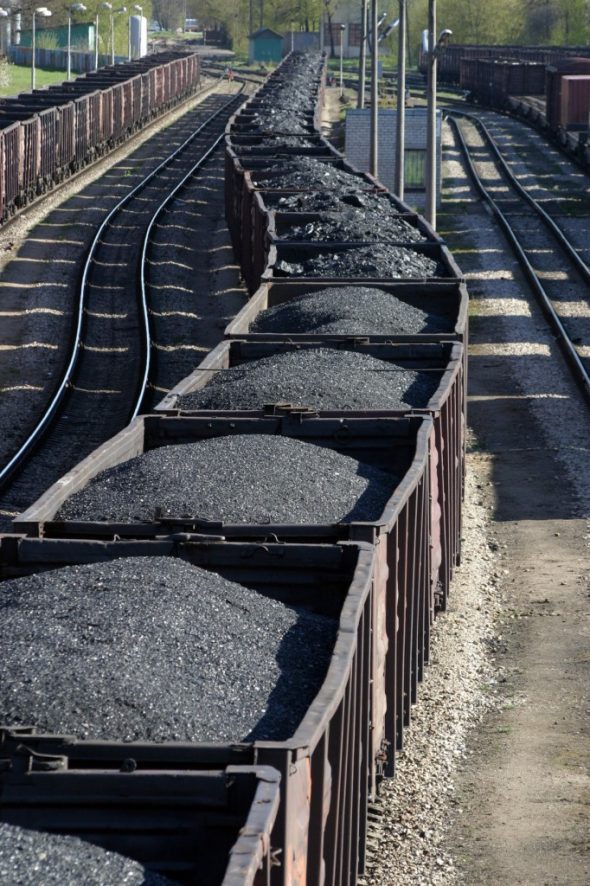Historically supplying the majority of America’s electricity, the coal industry has long been called “King Coal.” But this king’s throne is now under threat.
For the first time in US history, natural gas electricity generation equaled coal generation, according to preliminary April figures from the Energy Information Administration:
EIA provides more context to the preliminary data (which is subject to change):
Recently published electric power data show that, for the first time since EIA began collecting the data, generation from natural gas-fired plants is virtually equal to generation from coal-fired plants, with each fuel providing 32% of total generation. In April 2012, preliminary data show net electric generation from natural gas was 95.9 million megawatt-hours, only slightly below generation from coal, at 96.0 million megawatt-hours.
As shown in the chart above, there are strong seasonal trends in the overall demand for electric power. In April 2012, demand was low due to the mild spring weather. Also in April, natural gas prices as delivered to power plants were at a ten-year low. With warmer summer weather and increased electric demand for air conditioning, demand will increase, requiring increased output from both coal- and natural gas-fired generators.
As the agency points out, there are a variety of factors that contribute to the changes in generation such as seasonal variability, changes in prices, age of infrastructure, and rising or falling inventories. But looking at the chart above, we can see a clear longer-term trend: use of coal is declining steadily and natural gas is filling in the gap.
In fact, recent data from the EIA showed that generation from coal dropped 19 percent between the first quarter of 2011 and first quarter of 2012 — moving from 44.6 percent to 36 percent. If this preliminary data is correct, that means that coal generation fell another 4 percent between March and April of this year.
This is a mixed blessing from an emissions perspective. The fall in coal generation means we’ll likely see a decline in CO2 emissions from the fossil fuel sector by 3 percent this year, according to EIA. That will add to the 1.9 percent drop seen in 2011.
However, a large-scale switch to gas is no environmental panacea. Along with local air and water-quality concerns from natural gas fracking, scientists and environmental regulators are increasingly warning about lifeycle methane emissions from gas. Methane is a greenhouse gas 25 times more potent than carbon dioxide over a 100-year period. While there is still no definitive study on the methane intensity of natural gas, recent research suggests that leakages in the drilling and transport of gas could make it more harmful than coal.
Reacting to the concerns about methane leakages, a group of investors worth $20 trillion in assets recently penned a letter to the oil and gas industry calling on companies to proactively address the problem. Craig McKenzie, Head of Sustainability for the Scottish Widows Investment Partnership, told Climate Progress that his organization believes natural gas does play a role in the current energy transition — but not without controls on methane:
“Many climate hawks are skeptical that the shale gas revolution has any role to play in tackling climate change. We disagree – there’s a narrow window of a decade or two where it could help significantly. It may just be the fastest way to eliminate coal from the power sector in the US, and may be China. This isn’t just theoretical. US coal power generation has fallen a massive 20 per cent in one year largely, due to switching to cheap shale gas. But, as we’ve argued, even this defense of gas falls apart if the industry doesn’t eliminate fugitive methane emissions, which cancel out the climate benefit of a coal-gas switch for the first few decades. This major new investor initiative calling for best practice methane control technology and better regulation – globally – is intended to help make shale gas serve its climate purpose.”
Scottish Widows Investment Partnership, a major investor in fossil fuel projects, recently released a report concluding that that fugitive methane emissions from natural gas wipe out any climate benefits from a shift away from coal. The International Energy Agency has also warned that a massive global switch to natural gas could result in more than 6 degree F warming — resulting in out-of-control desertification, water shortages, and continued sea level rise.
Clearly, natural gas is playing a central role as the US transitions away from its dirtiest resource, coal. And that’s a good thing for carbon emissions in the short term. The question is, will unchecked growth and improper proper pollution controls negate any positive impact that natural gas may offer?
This article was originally published on Climate Progress – thinkprogress.org/climate. Reproduced with permission.







